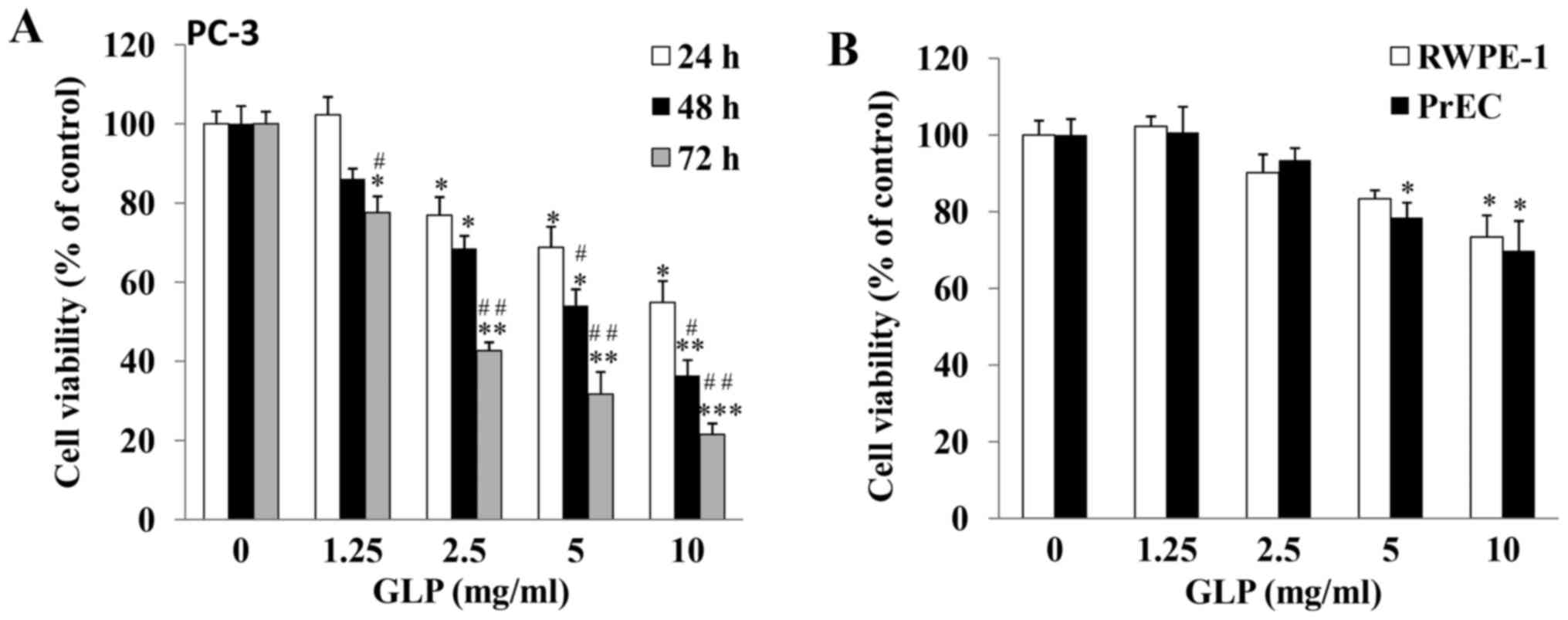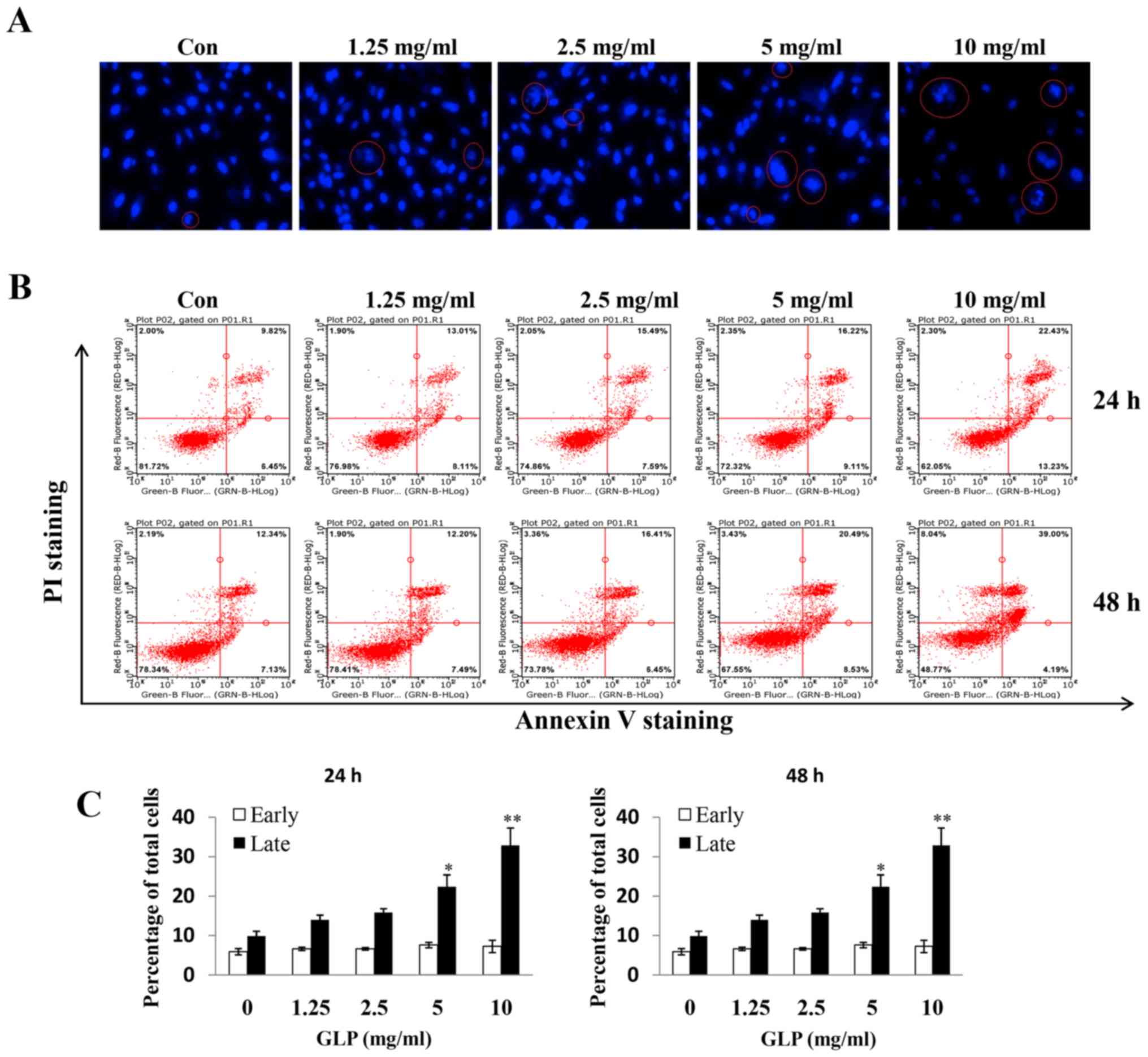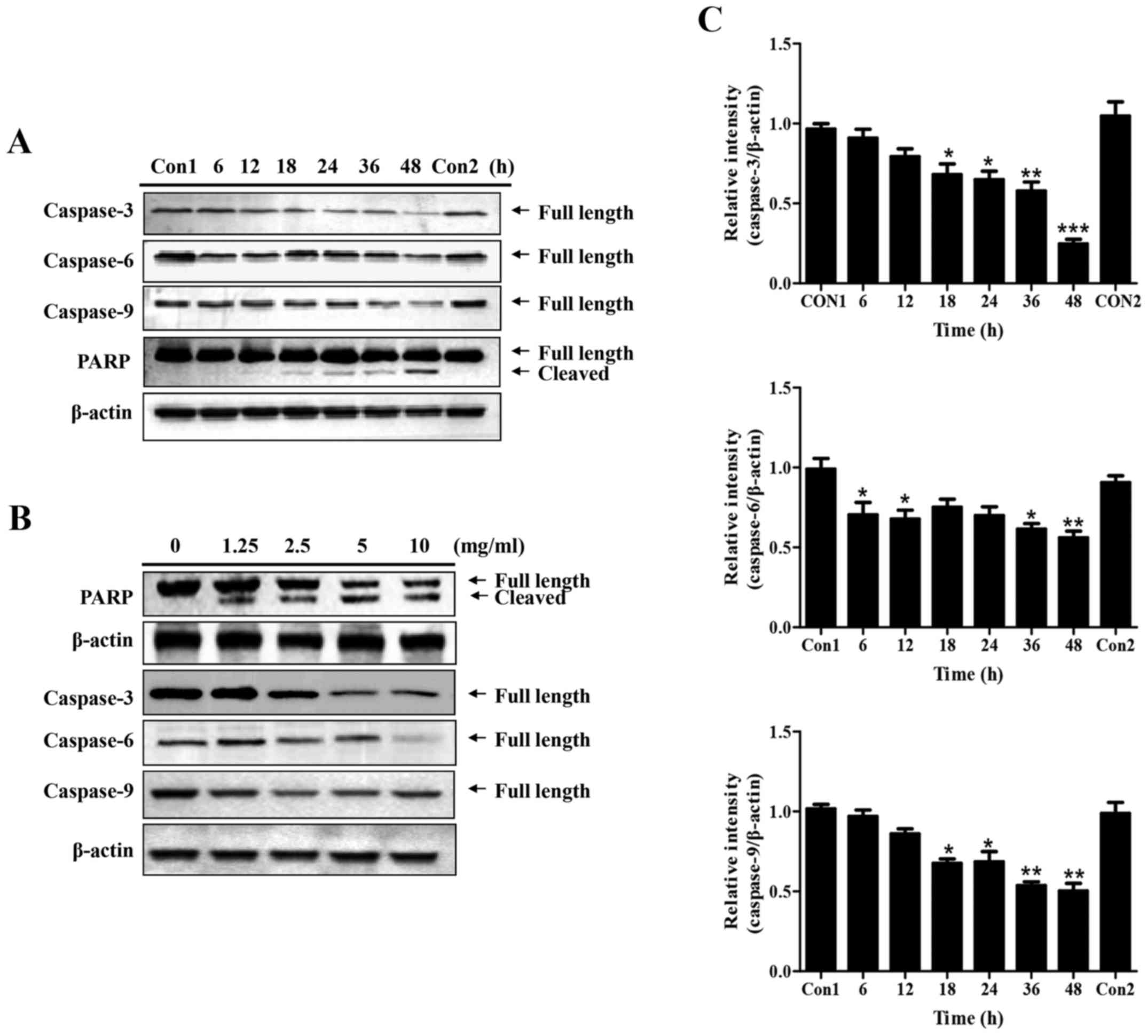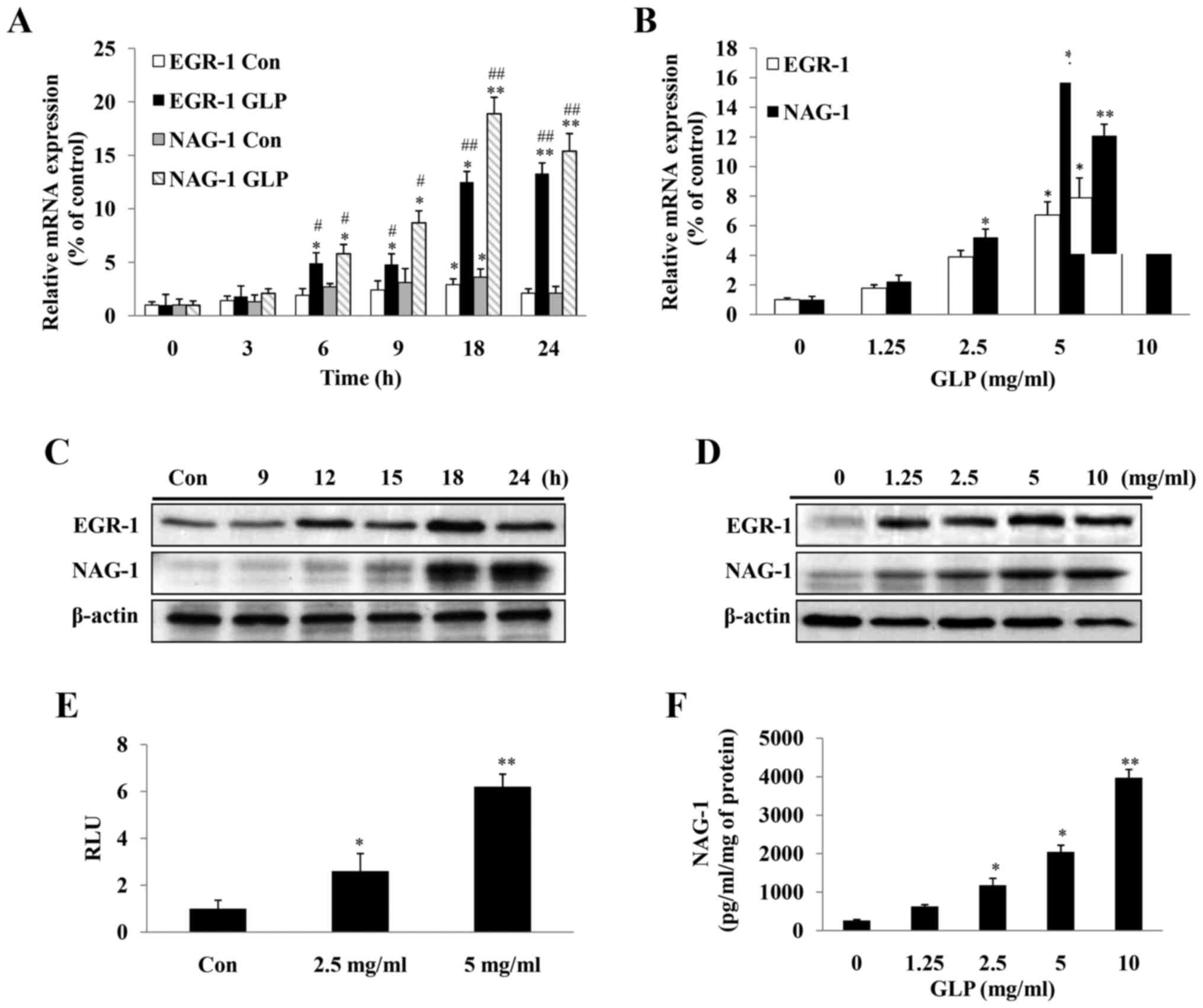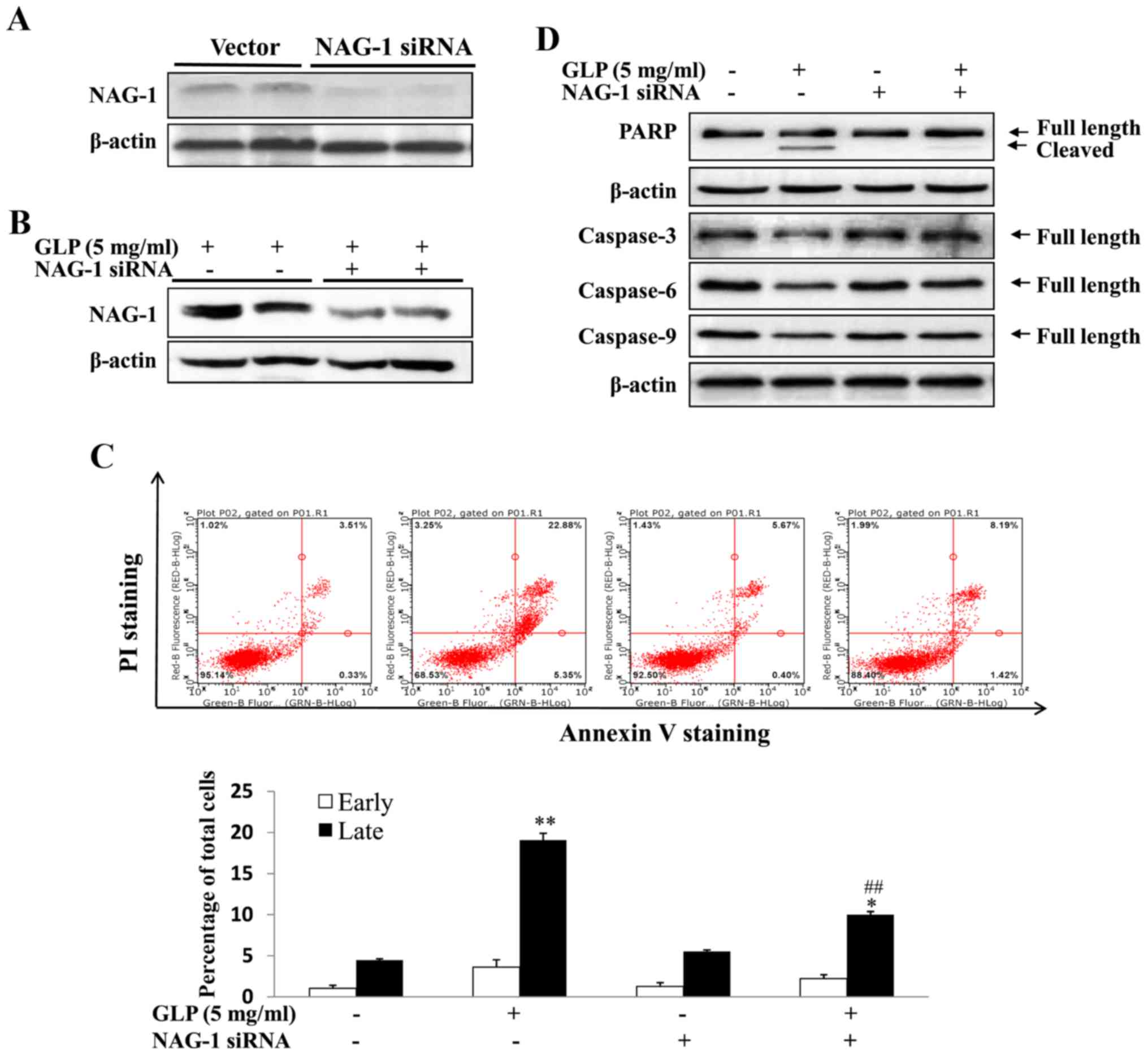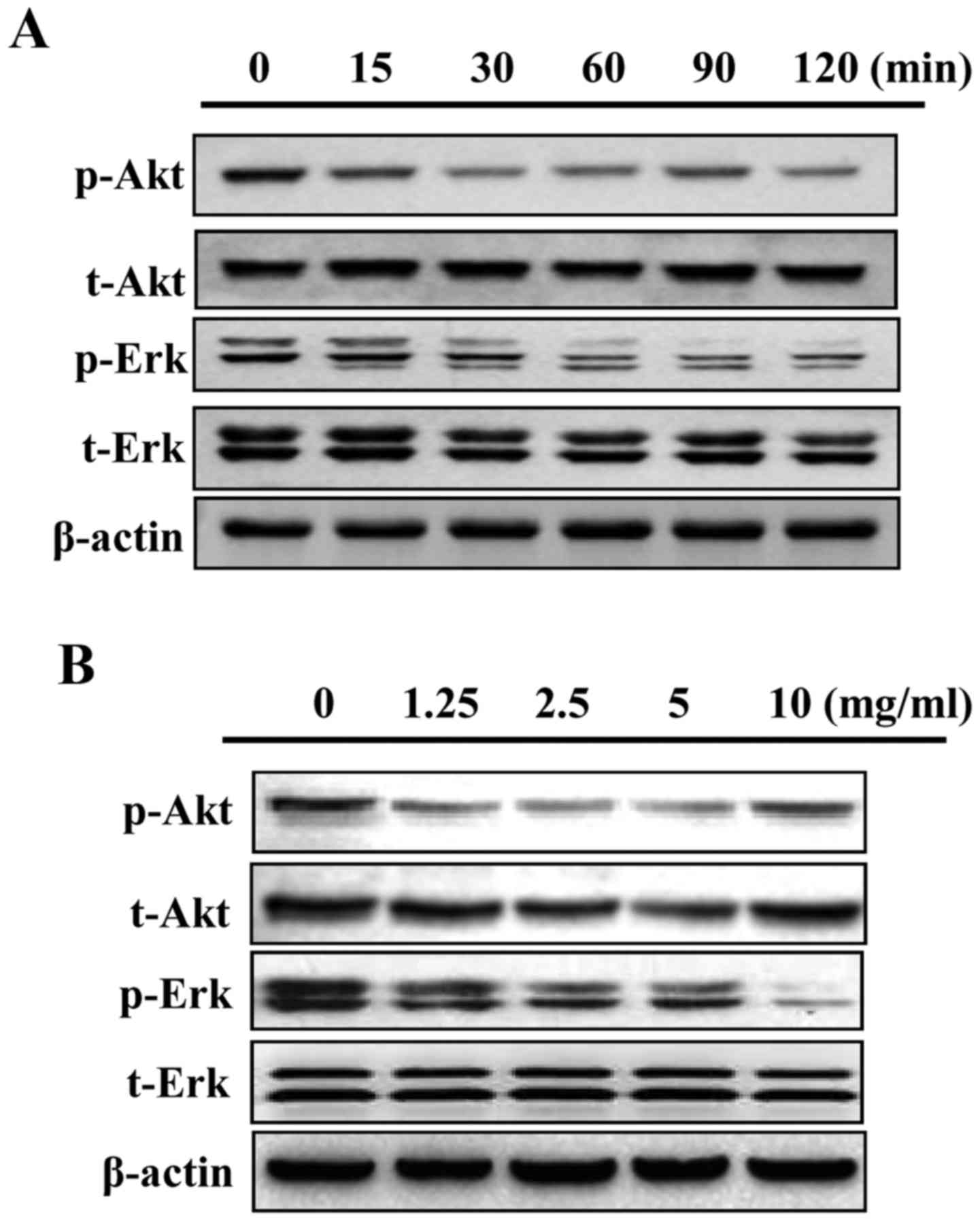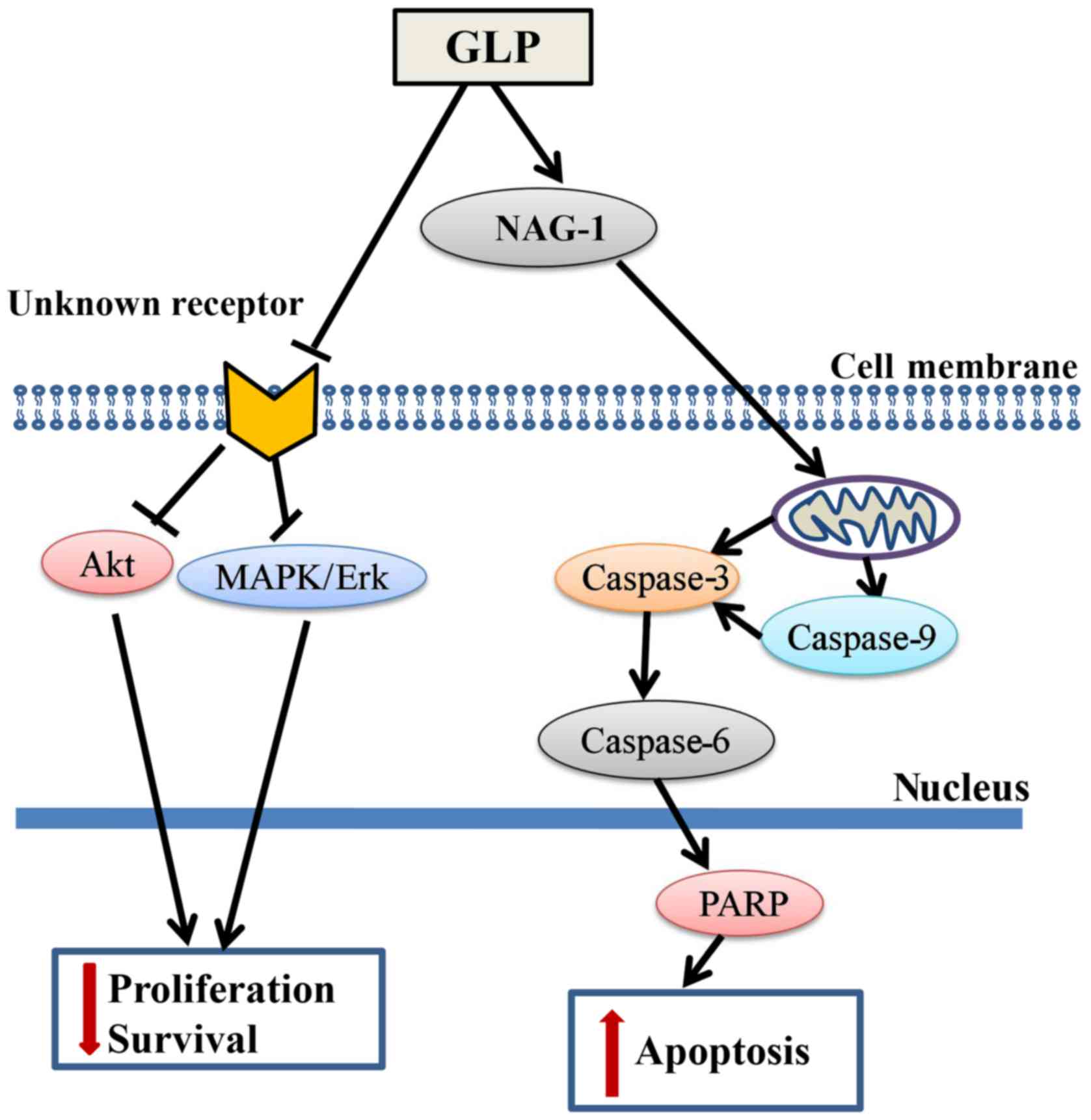|
1
|
Siegel RL, Miller KD and Jemal A: Cancer
Statistics, 2017. CA Cancer J Clin. 67:7–30. 2017. View Article : Google Scholar : PubMed/NCBI
|
|
2
|
Zaidman BZ, Wasser SP, Nevo E and Mahajna
J: Androgen receptor-dependent and -independent mechanisms mediate
Ganoderma lucidum activities in LNCaP prostate cancer cells. Int J
Oncol. 31:959–967. 2007.PubMed/NCBI
|
|
3
|
Baillargeon J, Platz EA, Rose DP, Pollock
BH, Ankerst DP, Haffner S, Higgins B, Lokshin A, Troyer D,
Hernandez J, et al: Obesity, adipokines, and prostate cancer in a
prospective population-based study. Cancer Epidemiol Biomarkers
Prev. 15:1331–1335. 2006. View Article : Google Scholar : PubMed/NCBI
|
|
4
|
Hettel D and Sharifi N: HSD3B1 status as a
biomarker of androgen deprivation resistance and implications for
prostate cancer. Nat Rev Urol. 15:191–196. 2017. View Article : Google Scholar : PubMed/NCBI
|
|
5
|
Feldman BJ and Feldman D: The development
of androgen-independent prostate cancer. Nat Rev Cancer. 1:34–45.
2001. View Article : Google Scholar
|
|
6
|
Mahajna J, Dotan N, Zaidman BZ, Petrova RD
and Wasser SP: Pharmacological values of medicinal mushrooms for
prostate cancer therapy: The case of Ganoderma lucidum. Nutr
Cancer. 61:16–26. 2009. View Article : Google Scholar : PubMed/NCBI
|
|
7
|
Bigler D, Gulding KM, Dann R, Sheabar FZ,
Conaway MR and Theodorescu D: Gene profiling and promoter reporter
assays: Novel tools for comparing the biological effects of
botanical extracts on human prostate cancer cells and understanding
their mechanisms of action. Oncogene. 22:1261–1272. 2003.
View Article : Google Scholar : PubMed/NCBI
|
|
8
|
Darzynkiewicz Z, Traganos F, Wu JM and
Chen S: Chinese herbal mixture PC SPES in treatment of prostate
cancer (Review). Int J Oncol. 17:729–736. 2000.PubMed/NCBI
|
|
9
|
Halicka H, Ardelt B, Juan G, Mittelman A,
Chen S, Traganos F and Darzynkiewicz Z: Apoptosis and cell cycle
effects induced by extracts of the Chinese herbal preparation PC
SPES. Int J Oncol. 11:437–448. 1997.PubMed/NCBI
|
|
10
|
Kubota T, Hisatake J, Hisatake Y, Said JW,
Chen SS, Holden S, Taguchi H and Koeffler HP: PC-SPES: A unique
inhibitor of proliferation of prostate cancer cells in vitro and in
vivo. Prostate. 42:163–171. 2000. View Article : Google Scholar : PubMed/NCBI
|
|
11
|
de la Taille A, Hayek OR, Burchardt M,
Burchardt T and Katz AE: Role of herbal compounds (PC-SPES) in
hormone-refractory prostate cancer: Two case reports. J Altern
Complement Med. 6:449–451. 2000. View Article : Google Scholar : PubMed/NCBI
|
|
12
|
de la Taille A, Hayek OR, Buttyan R,
Bagiella E, Burchardt M and Katz AE: Effects of a phytotherapeutic
agent, PC-SPES, on prostate cancer: A preliminary investigation on
human cell lines and patients. BJU Int. 84:845–850. 1999.
View Article : Google Scholar : PubMed/NCBI
|
|
13
|
DiPaola RS, Zhang H, Lambert GH, Meeker R,
Licitra E, Rafi MM, Zhu BT, Spaulding H, Goodin S, Toledano MB, et
al: Clinical and biologic activity of an estrogenic herbal
combination (PC-SPES) in prostate cancer. N Engl J Med.
339:785–791. 1998. View Article : Google Scholar : PubMed/NCBI
|
|
14
|
Pfeifer BL, Pirani JF, Hamann SR and
Klippel KF: PC-SPES, a dietary supplement for the treatment of
hormone-refractory prostate cancer. BJU Int. 85:481–485. 2000.
View Article : Google Scholar : PubMed/NCBI
|
|
15
|
Pirani JF: The effects of phytotherapeutic
agents on prostate cancer: An overview of recent clinical trials of
PC SPES. Urology. 58(Suppl 1): 36–38. 2001. View Article : Google Scholar : PubMed/NCBI
|
|
16
|
Small EJ, Frohlich MW, Bok R, Shinohara K,
Grossfeld G, Rozenblat Z, Kelly WK, Corry M and Reese DM:
Prospective trial of the herbal supplement PC-SPES in patients with
progressive prostate cancer. J Clin Oncol. 18:3595–3603. 2000.
View Article : Google Scholar : PubMed/NCBI
|
|
17
|
Chaudhary UB, Rashid M and Keane TE:
PC-SPES withdrawal response. Acta Oncol. 43:772–773. 2004.
View Article : Google Scholar
|
|
18
|
Cordell GA: PC-SPES: A brief overview.
Integr Cancer Ther. 1:271–286. 2002. View Article : Google Scholar
|
|
19
|
Bishop KS, Kao CH, Xu Y, Glucina MP,
Paterson RR and Ferguson LR: From 2000years of Ganoderma lucidum to
recent developments in nutraceuticals. Phytochemistry. 114:56–65.
2015. View Article : Google Scholar : PubMed/NCBI
|
|
20
|
Jiang J, Slivova V, Valachovicova T,
Harvey K and Sliva D: Ganoderma lucidum inhibits proliferation and
induces apoptosis in human prostate cancer cells PC-3. Int J Oncol.
24:1093–1099. 2004.PubMed/NCBI
|
|
21
|
Sliva D, Labarrere C, Slivova V, Sedlak M,
Lloyd FP Jr and Ho NW: Ganoderma lucidum suppresses motility of
highly invasive breast and prostate cancer cells. Biochem Biophys
Res Commun. 298:603–612. 2002. View Article : Google Scholar : PubMed/NCBI
|
|
22
|
Na K, Li K, Sang T, Wu K, Wang Y and Wang
X: Anticarcinogenic effects of water extract of sporoderm-broken
spores of Ganoderma lucidum on colorectal cancer in vitro and in
vivo. Int J Oncol. 50:1541–1554. 2017. View Article : Google Scholar : PubMed/NCBI
|
|
23
|
Wang X, Baek SJ and Eling TE: The diverse
roles of nonsteroidal anti-inflammatory drug activated gene
(NAG-1/GDF15) in cancer. Biochem Pharmacol. 85:597–606. 2013.
View Article : Google Scholar :
|
|
24
|
Husaini Y, Qiu MR, Lockwood GP, Luo XW,
Shang P, Kuffner T, Tsai VW, Jiang L, Russell PJ, Brown DA, et al:
Macrophage inhibitory cytokine-1 (MIC-1/GDF15) slows cancer
development but increases metastases in TRAMP prostate cancer prone
mice. PLoS One. 7:e438332012. View Article : Google Scholar : PubMed/NCBI
|
|
25
|
Piyanuch R, Sukhthankar M, Wandee G and
Baek SJ: Berberine, a natural isoquinoline alkaloid, induces NAG-1
and ATF3 expression in human colorectal cancer cells. Cancer Lett.
258:230–240. 2007. View Article : Google Scholar : PubMed/NCBI
|
|
26
|
Kang SU, Shin YS, Hwang HS, Baek SJ, Lee
SH and Kim CH: Tolfenamic acid induces apoptosis and growth
inhibition in head and neck cancer: Involvement of NAG-1
expression. PLoS One. 7:e349882012. View Article : Google Scholar : PubMed/NCBI
|
|
27
|
Tesei A, Rosetti M, Ulivi P, Fabbri F,
Medri L, Vannini I, Bolla M, Amadori D and Zoli W: Study of
molecular mechanisms of pro-apoptotic activity of NCX 4040, a novel
nitric oxide-releasing aspirin, in colon cancer cell lines. J
Transl Med. 5:522007. View Article : Google Scholar : PubMed/NCBI
|
|
28
|
Woo SM, Min KJ, Kim S, Park JW, Kim DE,
Chun KS, Kim YH, Lee TJ, Kim SH, Choi YH, et al: Silibinin induces
apoptosis of HT29 colon carcinoma cells through early growth
response-1 (EGR-1)-mediated non-steroidal anti-inflammatory
drug-activated gene-1 (NAG-1) up-regulation. Chem Biol Interact.
211:36–43. 2014. View Article : Google Scholar : PubMed/NCBI
|
|
29
|
Baek SJ, Kim KS, Nixon JB, Wilson LC and
Eling TE: Cyclooxygenase inhibitors regulate the expression of a
TGF-beta superfamily member that has proapoptotic and
antitumorigenic activities. Mol Pharmacol. 59:901–908. 2001.
View Article : Google Scholar : PubMed/NCBI
|
|
30
|
Livak KJ and Schmittgen TD: Analysis of
relative gene expression data using real-time quantitative PCR and
the 2(-Delta Delta C(T)) Method. Methods. 25:402–408. 2001.
View Article : Google Scholar
|
|
31
|
Yoshioka H, Kamitani H, Watanabe T and
Eling TE: Nonsteroidal anti-inflammatory drug-activated gene
(NAG-1/GDF15) expression is increased by the histone deacetylase
inhibitor trichostatin A. J Biol Chem. 283:33129–33137. 2008.
View Article : Google Scholar : PubMed/NCBI
|
|
32
|
Shim M and Eling TE: Vitamin E succinate
induces NAG-1 expression in a p38 kinase-dependent mechanism. Mol
Cancer Ther. 7:961–971. 2008. View Article : Google Scholar : PubMed/NCBI
|
|
33
|
Dillard PR, Lin MF and Khan SA:
Androgen-independent prostate cancer cells acquire the complete
steroidogenic potential of synthesizing testosterone from
cholesterol. Mol Cell Endocrinol. 295:115–120. 2008. View Article : Google Scholar : PubMed/NCBI
|
|
34
|
Tai S, Sun Y, Squires JM, Zhang H, Oh WK,
Liang CZ and Huang J: PC3 is a cell line characteristic of
prostatic small cell carcinoma. Prostate. 71:1668–1679. 2011.
View Article : Google Scholar : PubMed/NCBI
|
|
35
|
Auyeung KK, Cho CH and Ko JK: A novel
anticancer effect of Astragalus saponins: Transcriptional
activation of NSAID-activated gene. Int J Cancer. 125:1082–1091.
2009. View Article : Google Scholar : PubMed/NCBI
|
|
36
|
Baek SJ, Kim JS, Jackson FR, Eling TE,
McEntee MF and Lee SH: Epicatechin gallate-induced expression of
NAG-1 is associated with growth inhibition and apoptosis in colon
cancer cells. Carcinogenesis. 25:2425–2432. 2004. View Article : Google Scholar : PubMed/NCBI
|
|
37
|
Jutooru I, Chadalapaka G, Chintharlapalli
S, Papineni S and Safe S: Induction of apoptosis and nonsteroidal
anti-inflammatory drug-activated gene 1 in pancreatic cancer cells
by a glycyrrhetinic acid derivative. Mol Carcinog. 48:692–702.
2009. View Article : Google Scholar : PubMed/NCBI
|
|
38
|
Soto-Cerrato V, Viñals F, Lambert JR,
Kelly JA and Pérez-Tomás R: Prodigiosin induces the proapoptotic
gene NAG-1 via glycogen synthase kinase-3beta activity in human
breast cancer cells. Mol Cancer Ther. 6:362–369. 2007. View Article : Google Scholar : PubMed/NCBI
|
|
39
|
Li K, Na K, Sang T, Wu K, Wang Y and Wang
X: The ethanol extracts of sporoderm-broken spores of Ganoderma
lucidum inhibit colorectal cancer in vitro and in vivo. Oncol Rep.
38:2803–2813. 2017. View Article : Google Scholar : PubMed/NCBI
|
|
40
|
Kladar NV, Gavarić NS and Božin BN:
Ganoderma: Insights into anticancer effects. Eur J Cancer Prev.
25:462–471. 2016. View Article : Google Scholar
|
|
41
|
Hsieh TC and Wu JM: Suppression of
proliferation and oxidative stress by extracts of Ganoderma lucidum
in the ovarian cancer cell line OVCAR-3. Int J Mol Med.
28:1065–1069. 2011.PubMed/NCBI
|
|
42
|
Cao QZ and Lin ZB: Ganoderma lucidum
polysaccharides peptide inhibits the growth of vascular endothelial
cell and the induction of VEGF in human lung cancer cell. Life Sci.
78:1457–1463. 2006. View Article : Google Scholar
|
|
43
|
Gill BS, Navgeet and Kumar S: Ganoderma
lucidum targeting lung cancer signaling: A review. Tumour Biol.
39:1010428317707437. 2017. View Article : Google Scholar : PubMed/NCBI
|
|
44
|
Loganathan J, Jiang J, Smith A, Jedinak A,
Thyagarajan-Sahu A, Sandusky GE, Nakshatri H and Sliva D: The
mushroom Ganoderma lucidum suppresses breast-to-lung cancer
metastasis through the inhibition of pro-invasive genes. Int J
Oncol. 44:2009–2015. 2014. View Article : Google Scholar : PubMed/NCBI
|
|
45
|
Li A, Shuai X, Jia Z, Li H, Liang X, Su D
and Guo W: Ganoderma lucidum polysaccharide extract inhibits
hepatocellular carcinoma growth by downregulating regulatory T
cells accumulation and function by inducing microRNA-125b. J Transl
Med. 13:1002015. View Article : Google Scholar : PubMed/NCBI
|
|
46
|
Yang G, Yang L, Zhuang Y, Qian X and Shen
Y: Ganoderma lucidum polysaccharide exerts anti-tumor activity via
MAPK pathways in HL-60 acute leukemia cells. J Recept Signal
Transduct Res. 36:6–13. 2016. View Article : Google Scholar
|
|
47
|
Zhao X, Zhou D, Liu Y, Li C, Zhao X, Li Y
and Li W: Ganoderma lucidum polysaccharide inhibits prostate cancer
cell migration via the protein arginine methyltransferase 6
signaling pathway. Mol Med Rep. 17:147–157. 2018.
|
|
48
|
Hsieh T, Chen SS, Wang X and Wu JM:
Regulation of androgen receptor (AR) and prostate specific antigen
(PSA) expression in the androgen-responsive human prostate LNCaP
cells by ethanolic extracts of the Chinese herbal preparation,
PC-SPES. Biochem Mol Biol Int. 42:535–544. 1997.PubMed/NCBI
|
|
49
|
Geliebter J, Tiwari R and Wu JM: PC-SPES
in prostate cancer. N Engl J Med. 340:567–568. 1999.PubMed/NCBI
|
|
50
|
Liu J, Tamura S, Kurashiki K, Shimizu K,
Noda K, Konishi F, Kumamoto S and Kondo R: Anti-androgen effects of
extracts and compounds from Ganoderma lucidum. Chem Biodivers.
6:231–243. 2009. View Article : Google Scholar : PubMed/NCBI
|
|
51
|
Ferreira IC, Heleno SA, Reis FS, Stojkovic
D, Queiroz MJ, Vasconcelos MH and Sokovic M: Chemical features of
Ganoderma polysaccharides with antioxidant, antitumor and
antimicrobial activities. Phytochemistry. 114:38–55. 2015.
View Article : Google Scholar
|
|
52
|
Guo L, Xie J, Ruan Y, Zhou L, Zhu H, Yun
X, Jiang Y, Lü L, Chen K, Min Z, et al: Characterization and
immunostimulatory activity of a polysaccharide from the spores of
Ganoderma lucidum. Int Immunopharmacol. 9:1175–1182. 2009.
View Article : Google Scholar : PubMed/NCBI
|
|
53
|
Hanahan D and Weinberg RA: Hallmarks of
cancer: The next generation. Cell. 144:646–674. 2011. View Article : Google Scholar : PubMed/NCBI
|
|
54
|
Fuchs Y and Steller H: Programmed cell
death in animal development and disease. Cell. 147:742–758. 2011.
View Article : Google Scholar : PubMed/NCBI
|
|
55
|
McIlwain DR, Berger T and Mak TW: Caspase
functions in cell death and disease. Cold Spring Harb Perspect
Biol. 7:72015. View Article : Google Scholar
|
|
56
|
Shang D, Li Y, Wang C, Wang X, Yu Z and Fu
X: A novel polysaccharide from Se-enriched Ganoderma lucidum
induces apoptosis of human breast cancer cells. Oncol Rep.
25:267–272. 2011.
|
|
57
|
Liang Z, Yi Y, Guo Y, Wang R, Hu Q and
Xiong X: Chemical characterization and antitumor activities of
polysaccharide extracted from Ganoderma lucidum. Int J Mol Sci.
15:9103–9116. 2014. View Article : Google Scholar : PubMed/NCBI
|
|
58
|
Dasgupta A, Nomura M, Shuck R and Yustein
J: Cancer's Achilles' Heel: Apoptosis and necroptosis to the
rescue. Int J Mol Sci. 18:182016. View Article : Google Scholar
|
|
59
|
Liggett JL, Zhang X, Eling TE and Baek SJ:
Anti-tumor activity of non-steroidal anti-inflammatory drugs:
Cyclooxygenase-independent targets. Cancer Lett. 346:217–224. 2014.
View Article : Google Scholar : PubMed/NCBI
|
|
60
|
Lee SH, Yamaguchi K, Kim JS, Eling TE,
Safe S, Park Y and Baek SJ: Conjugated linoleic acid stimulates an
anti-tumorigenic protein NAG-1 in an isomer specific manner.
Carcinogenesis. 27:972–981. 2006. View Article : Google Scholar
|
|
61
|
Chiu SC, Wang MJ, Yang HH, Chen SP, Huang
SY, Chen YL, Lin SZ, Harn HJ and Pang CY: Activation of NAG-1 via
JNK signaling revealed an isochaihulactone-triggered cell death in
human LNCaP prostate cancer cells. BMC Cancer. 11:1462011.
View Article : Google Scholar : PubMed/NCBI
|
|
62
|
Wynne S and Djakiew D: NSAID inhibition of
prostate cancer cell migration is mediated by Nag-1 Induction via
the p38 MAPK-p75(NTR) pathway. Mol Cancer Res. 8:1656–1664. 2010.
View Article : Google Scholar : PubMed/NCBI
|
|
63
|
Tan M, Wang Y, Guan K and Sun Y:
PTGF-beta, a type beta transforming growth factor (TGF-beta)
superfamily member, is a p53 target gene that inhibits tumor cell
growth via TGF-beta signaling pathway. Proc Natl Acad Sci USA.
97:109–114. 2000. View Article : Google Scholar : PubMed/NCBI
|
|
64
|
Lambert JR, Kelly JA, Shim M, Huffer WE,
Nordeen SK, Baek SJ, Eling TE and Lucia MS: Prostate derived factor
in human prostate cancer cells: Gene induction by vitamin D via a
p53-dependent mechanism and inhibition of prostate cancer cell
growth. J Cell Physiol. 208:566–574. 2006. View Article : Google Scholar : PubMed/NCBI
|
|
65
|
Husaini Y, Lockwood GP, Nguyen TV, Tsai
VW, Mohammad MG, Russell PJ, Brown DA and Breit SN: Macrophage
inhibitory cytokine-1 (MIC-1/GDF15) gene deletion promotes cancer
growth in TRAMP prostate cancer prone mice. PLoS One.
10:e01151892015. View Article : Google Scholar : PubMed/NCBI
|
|
66
|
Brown DA, Ward RL, Buckhaults P, Liu T,
Romans KE, Hawkins NJ, Bauskin AR, Kinzler KW, Vogelstein B and
Breit SN: MIC-1 serum level and genotype: Associations with
progress and prognosis of colorectal carcinoma. Clin Cancer Res.
9:2642–2650. 2003.PubMed/NCBI
|
|
67
|
Welsh JB, Sapinoso LM, Kern SG, Brown DA,
Liu T, Bauskin AR, Ward RL, Hawkins NJ, Quinn DI, Russell PJ, et
al: Large-scale delineation of secreted protein biomarkers
overexpressed in cancer tissue and serum. Proc Natl Acad Sci USA.
100:3410–3415. 2003. View Article : Google Scholar : PubMed/NCBI
|
|
68
|
Selander KS, Brown DA, Sequeiros GB,
Hunter M, Desmond R, Parpala T, Risteli J, Breit SN and
Jukkola-Vuorinen A: Serum macrophage inhibitory cytokine-1
concentrations correlate with the presence of prostate cancer bone
metastases. Cancer Epidemiol Biomarkers Prev. 16:532–537. 2007.
View Article : Google Scholar : PubMed/NCBI
|
|
69
|
Senapati S, Rachagani S, Chaudhary K,
Johansson SL, Singh RK and Batra SK: Overexpression of macrophage
inhibitory cytokine-1 induces metastasis of human prostate cancer
cells through the FAK-RhoA signaling pathway. Oncogene.
29:1293–1302. 2010. View Article : Google Scholar
|
|
70
|
Baek SJ, Horowitz JM and Eling TE:
Molecular cloning and characterization of human nonsteroidal
anti-inflammatory drug-activated gene promoter. Basal transcription
is mediated by Sp1 and Sp3. J Biol Chem. 276:33384–33392. 2001.
View Article : Google Scholar : PubMed/NCBI
|
|
71
|
Kang SU, Lee BS, Lee SH, Baek SJ, Shin YS
and Kim CH: Expression of NSAID-activated gene-1 by EGCG in head
and neck cancer: Involvement of ATM-dependent p53 expression. J
Nutr Biochem. 24:986–999. 2013. View Article : Google Scholar
|
|
72
|
Zhong Y, Krisanapun C, Lee SH, Nualsanit
T, Sams C, Peungvicha P and Baek SJ: Molecular targets of apigenin
in colorectal cancer cells: Involvement of p21, NAG-1 and p53. Eur
J Cancer. 46:3365–3374. 2010. View Article : Google Scholar : PubMed/NCBI
|
|
73
|
Krones-Herzig A, Mittal S, Yule K, Liang
H, English C, Urcis R, Soni T, Adamson ED and Mercola D: Early
growth response 1 acts as a tumor suppressor in vivo and in vitro
via regulation of p53. Cancer Res. 65:5133–5143. 2005. View Article : Google Scholar : PubMed/NCBI
|
|
74
|
Baek SJ, Kim JS, Moore SM, Lee SH,
Martinez J and Eling TE: Cyclooxygenase inhibitors induce the
expression of the tumor suppressor gene EGR-1, which results in the
up-regulation of NAG-1, an antitumorigenic protein. Mol Pharmacol.
67:356–364. 2005. View Article : Google Scholar
|
|
75
|
Lim JH, Park JW, Min DS, Chang JS, Lee YH,
Park YB, Choi KS and Kwon TK: NAG-1 up-regulation mediated by EGR-1
and p53 is critical for quercetin-induced apoptosis in HCT116 colon
carcinoma cells. Apoptosis. 12:411–421. 2007. View Article : Google Scholar
|
|
76
|
Baek SJ, Wilson LC, Hsi LC and Eling TE:
Troglitazone, a peroxisome proliferator-activated receptor gamma
(PPAR gamma) ligand, selectively induces the early growth
response-1 gene independently of PPAR gamma. A novel mechanism for
its anti-tumorigenic activity. J Biol Chem. 278:5845–5853. 2003.
View Article : Google Scholar
|
|
77
|
Chintharlapalli S, Papineni S, Baek SJ,
Liu S and Safe S:
1,1-Bis(3′-indolyl)-1-(p-substitutedphenyl)methanes are peroxisome
proliferator-activated receptor gamma agonists but decrease HCT-116
colon cancer cell survival through receptor-independent activation
of early growth response-1 and nonsteroidal anti-inflammatory
drug-activated gene-1. Mol Pharmacol. 68:1782–1792. 2005.PubMed/NCBI
|
|
78
|
Lee SH, Krisanapun C and Baek SJ:
NSAID-activated gene-1 as a molecular target for capsaicin-induced
apoptosis through a novel molecular mechanism involving GSK3beta,
C/EBPbeta and ATF3. Carcinogenesis. 31:719–728. 2010. View Article : Google Scholar : PubMed/NCBI
|
|
79
|
Nualsanit T, Rojanapanthu P, Gritsanapan
W, Lee SH, Lawson D and Baek SJ: Damnacanthal, a noni component,
exhibits anti-tumorigenic activity in human colorectal cancer
cells. J Nutr Biochem. 23:915–923. 2012. View Article : Google Scholar
|
|
80
|
Vivanco I and Sawyers CL: The
phosphatidylinositol 3-Kinase AKT pathway in human cancer. Nat Rev
Cancer. 2:489–501. 2002. View
Article : Google Scholar : PubMed/NCBI
|
|
81
|
Burotto M, Chiou VL, Lee JM and Kohn EC:
The MAPK pathway across different malignancies: A new perspective.
Cancer. 120:3446–3456. 2014. View Article : Google Scholar : PubMed/NCBI
|















